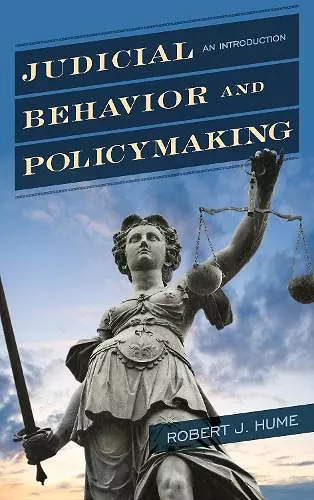Judicial Behavior and Policymaking
An Introduction
Format:Paperback
Publisher:Rowman & Littlefield
Published:23rd Jan '18
Currently unavailable, and unfortunately no date known when it will be back

This book serves as an introduction to judicial politics, examining decision-making processes and the influence of various factors on judges. Judicial Behavior and Policymaking is an essential resource.
In Judicial Behavior and Policymaking, students are introduced to both qualitative and quantitative methods essential for analyzing data within the realm of judicial politics. This engaging text serves as a comprehensive guide to understanding how political scientists conduct research about the courts, making it an invaluable resource for those looking to delve into this complex field. By breaking down intricate concepts, it ensures that readers can grasp the fundamental principles of judicial behavior and its implications for policymaking.
The book explores the intricate politics of judging, shedding light on the factors that influence judicial decision-making. It addresses critical questions such as why judges arrive at certain decisions, who holds the power to sway these decisions, and the broader consequences that court rulings have on policy. This exploration is crucial for anyone interested in the intersection of law and politics, as it reveals the dynamics at play within the judicial system.
Designed for both undergraduate and graduate students, Judicial Behavior and Policymaking offers an accessible yet thorough introduction to judicial politics. By familiarizing readers with the methodologies employed by professional political scientists, it equips them with the tools necessary to critically analyze and understand the complexities of the judicial landscape. This text stands out as a foundational resource for those eager to explore the nuanced relationship between judicial behavior and policymaking.
Hume presents a social-scientific take on the politics of judging. This brief volume focuses on empirical versus normative questions that are key to fostering an analytical approach to what we know about courts and judging. . . The supplementary primary source excerpts are the standard fare for judicial process textbooks. . . they provide solid applications of the concepts introduced in the text. The structure of the book is organized by social science theories, which provides an interesting frame for presenting concepts organically, on an as-needed basis. This makes the flow of the book superior to that of many similar texts. Although the book covers many of the basics, it occasionally assumes some prior knowledge. It draws more heavily from the perspective of political science than many similar texts, which makes it an important supplement to a more traditional text in courses on judging, judicial process, or law and society. Summing Up: Recommended. Upper-division undergraduates through professionals. * CHOICE *
Judicial Behavior and Policymaking is a concise introduction to the politics of judging. With a unique focus on judicial behavior as research, the text clearly presents the arguments and theories concerning judicial decision-making, selection methods, and the place of judges in American society. With emphasis given to both federal and state courts and the clarity of it presentation, Judicial Behavior is an appropriate supplementary text for any undergraduate course on judicial behavior, law and society, or constitutional law. -- Andrew H. Sidman, John Jay College of Criminal Justice, CUNY
This text provides a nice overview of theories and findings in the judicial politics literature yet remains accessible to undergraduate students--a great option for courses focused on judicial politics. -- Richard Vining, University of Georgia
ISBN: 9781442276048
Dimensions: 229mm x 152mm x 11mm
Weight: 318g
264 pages